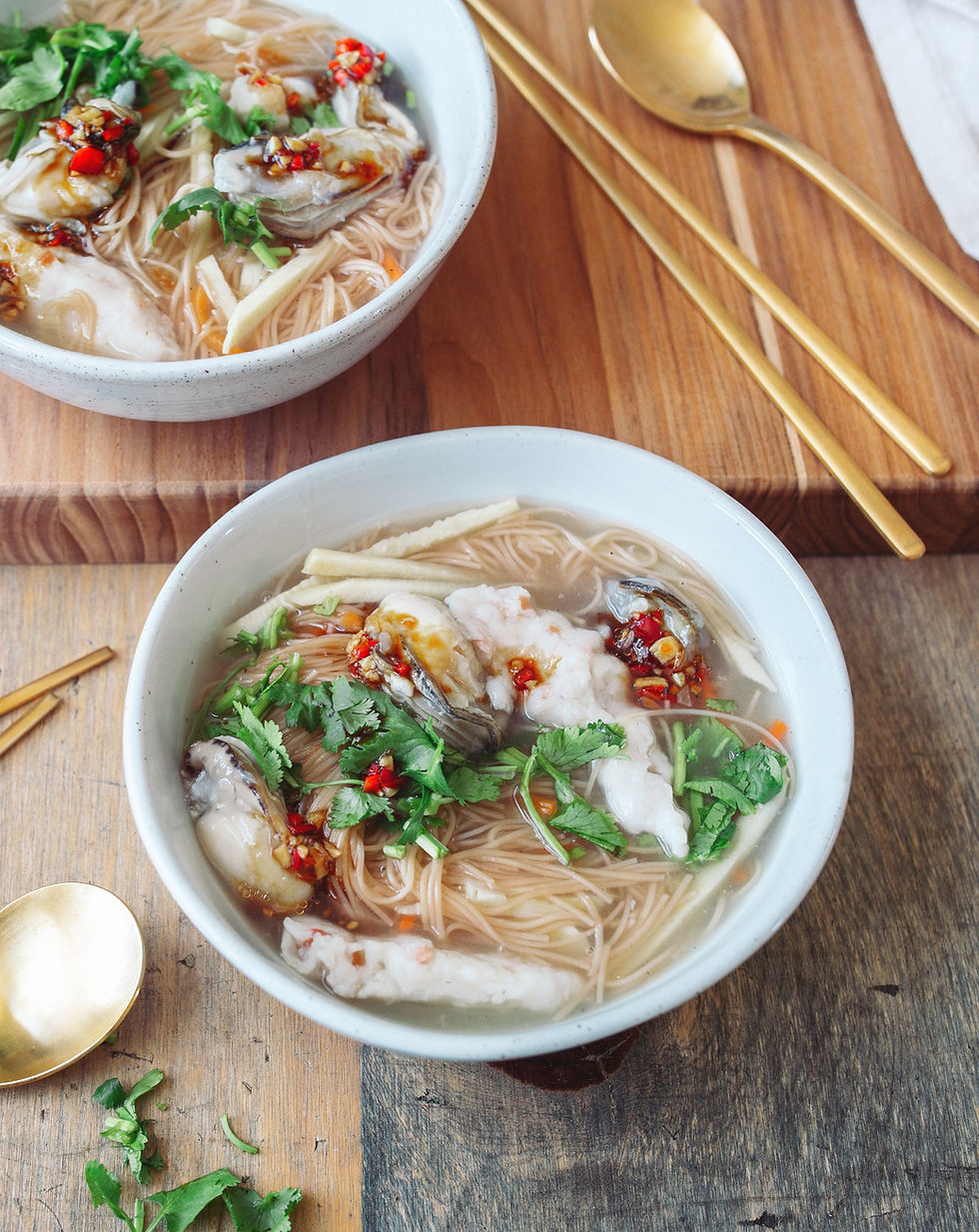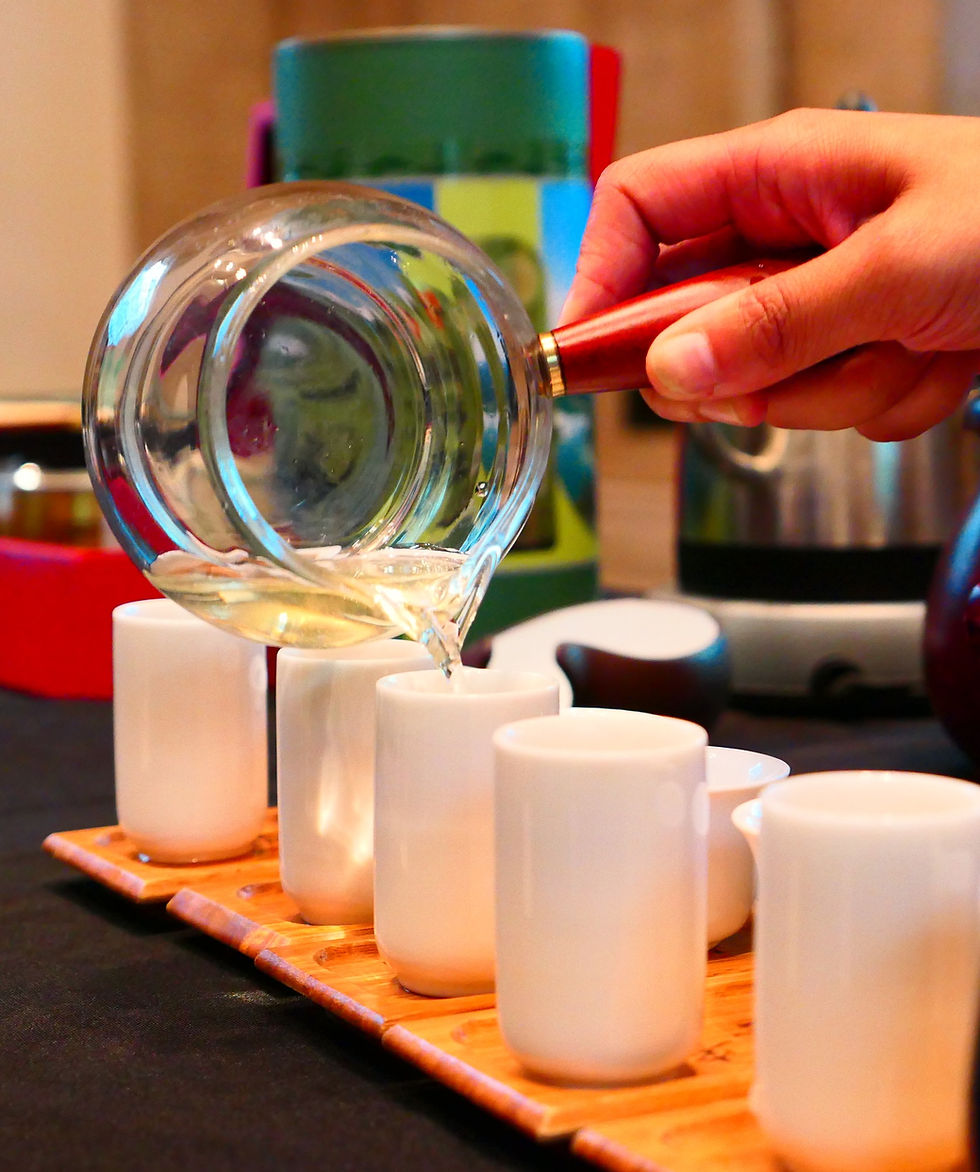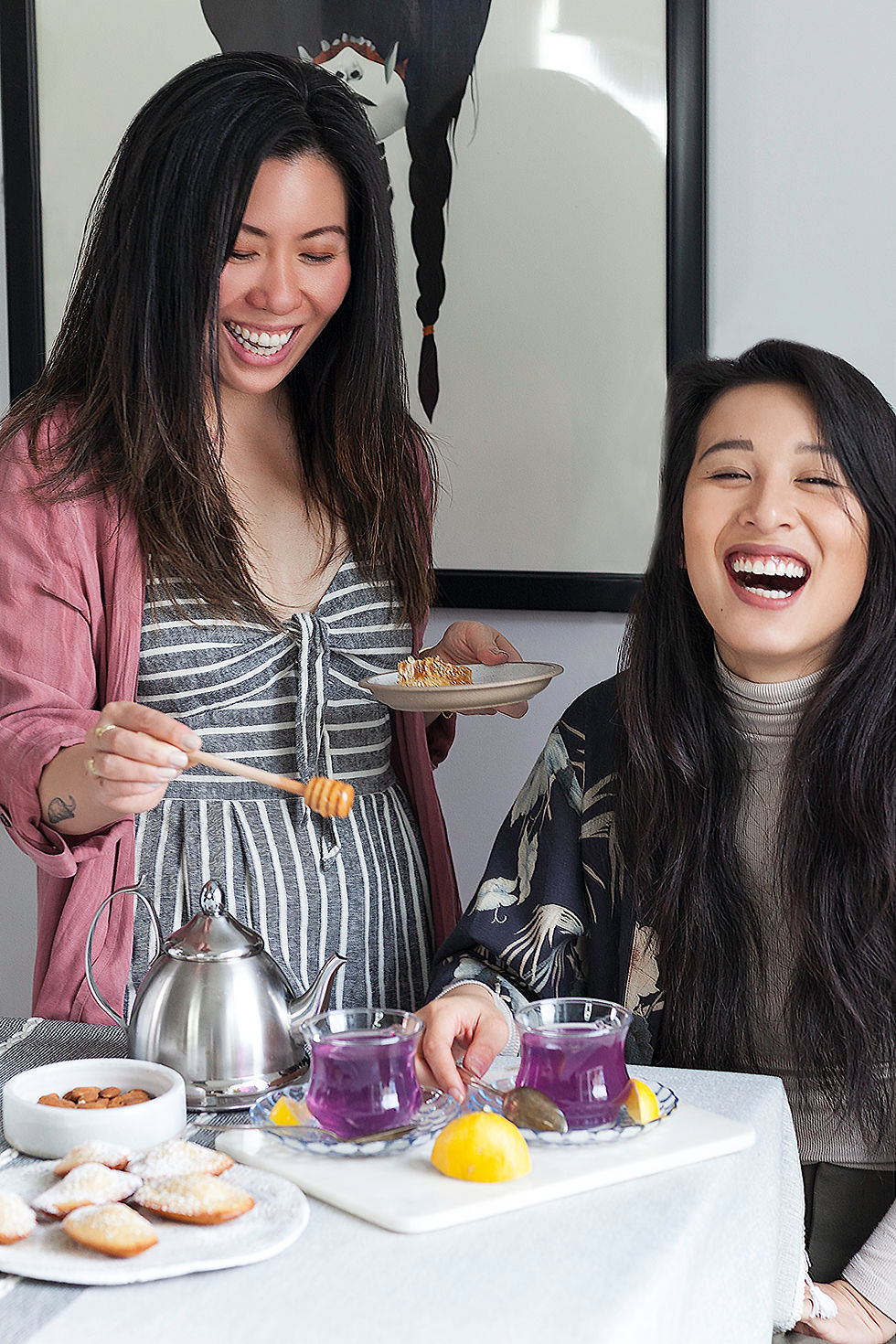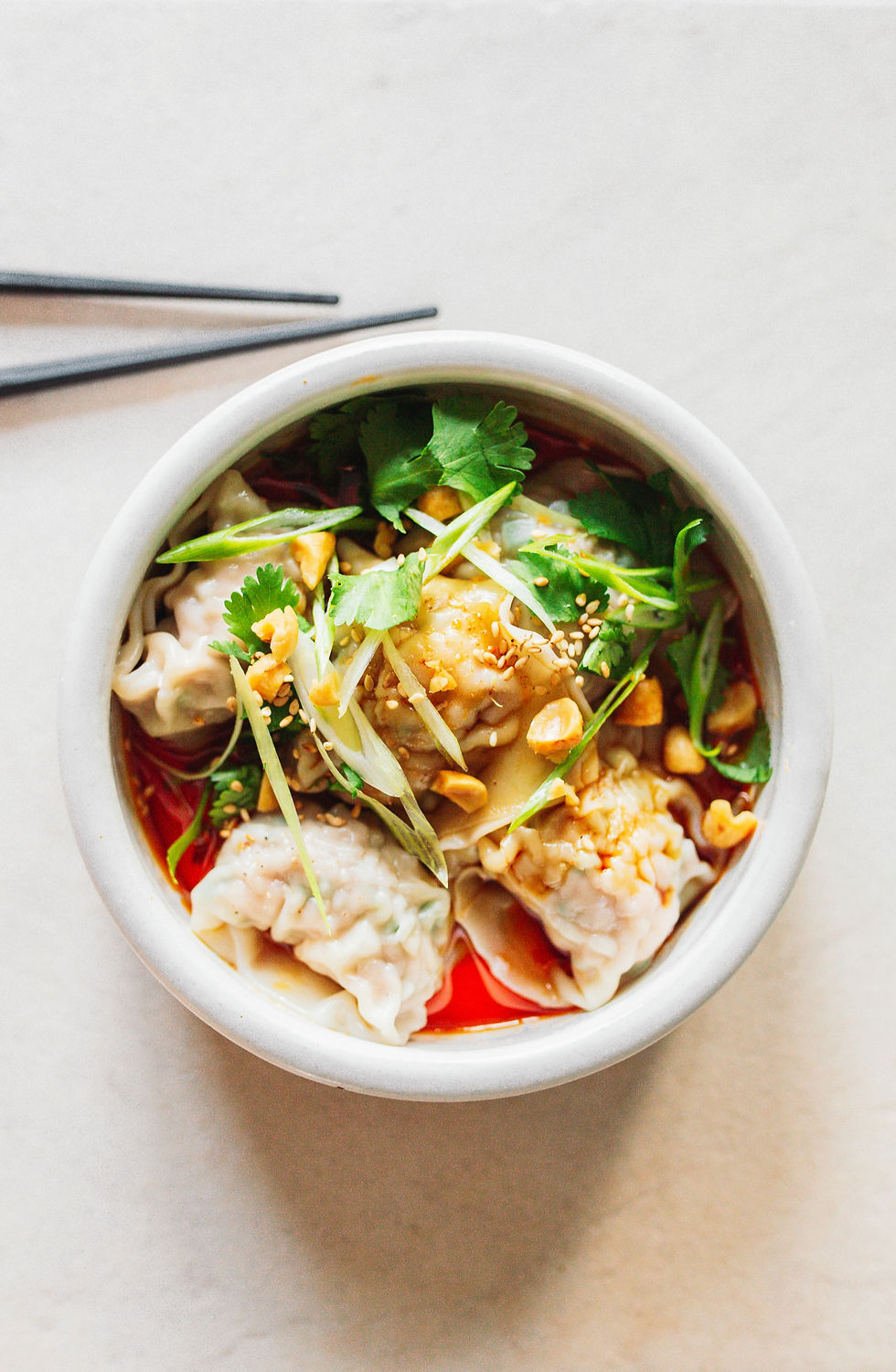Food As Medicine
- Jamie Evans

- Aug 27, 2019
- 7 min read
How two leading voices in the Asian American community tapped into their roots to bring cannabis cuisine to the modern consumer
Photo by: Heather Tafolla @heathertafolla
For centuries, cooking has been a sacred art that combines aromas, flavors, and ingredients to create appetizing dishes pleasing our palates. As our ancestors knew long ago, a well-prepared meal not only offers us sustenance and delight, but food can also be used as medicine.
At a July event held at the Asian Art Museum in San Francisco, guests were treated to an evening exploring Ancient China and the ways in which cannabis is used as a healing herb in cooking. Led by Monica Lo, Founder of Sous Weed®, and Felicity Chen, Co-Founder of Potli®, this educational affair provided an in-depth look into the new frontier of cannabis cuisine with a reflection of the past (plus an incredible tea ceremony led by the Chen Family).
By tapping into their cultural roots, both Lo and Chen have discovered unique ways to introduce cannabis to consumers, with a specific focus on creating infused food. As passionate gourmands and culinary artists, learning how to combine cannabis with cuisine came naturally, but both of these pioneering entrepreneurs came into the cannabis space searching for holistic ways to heal.
Launching Sous Weed in 2015, Monica Lo created her blog as a way to document her sous vide cannabis creations at home. At the time, she had a herniated disc in her lower back and was living with unbearable pain. Sensitive to prescription pills, Lo found another way to find relief, which incorporated food, cannabis, and traditional Chinese recipes. By using the sous vide method, she could discreetly infuse cannabis into her meals to help manage pain. She was able to create her own food medicine, in which she now shares with the world via her acclaimed recipes and cannabis food photography. Lo is also a co-founder of the Asian Americans For Cannabis Education, which is an organization dedicated to connecting and empowering Asian communities to educate the public on cannabis issues, news, and policy worldwide.

Monica Lo's Taiwanese Oyster Vermicelli with Real Oyster Cult Chelsea Gems
Photo by: Monica Lo @sousweed
Felicity Chen found her way into the cannabis space while searching for ways to help aid her mother’s asthma. By growing up in a traditional Chinese household, herbal medicine was frequently used to relieve many different ailments. Instead of using medications such as Advil, Chen remembers drinking tea in her early days to find relief. After discovering the healing powers of cannabis, she wanted to share the benefits with her family but knew that cannabis was a sensitive topic. While smoking weed can often be frowned upon, Chen quickly discovered that cannabis can be combined with honey to deliver powerful healing effects. She began infusing her own line of products with business partner Christine Yi. By combining their signature cannabis honey with tea, her mother was able to find relief using cannabis as a pantry food item. Since then, she has expanded the line of products and created a national infused-food company, Potli, which produces infused honey, olive oil, and chili oil available in hemp-infused or cannabis-infused options where legal.
Potli products at an August 8th event
Photo by: Jamie Evans @TheHerbSomm
To learn more about how these two leading voices in the cannabis community tapped into their cultural roots to bring cannabis cuisine to the modern consumer, I was lucky enough to catch up with Monica Lo and Felicity Chen after their talk at the Asian Art Museum.
Monica, your talk at the Asian Art Museum was fantastic. It provided such an in-depth look at the ancient roots of cannabis in China. What inspired you to do this research? As industry leaders, we have a responsibility to course-correct and create the change we wish to see. I believe it’s important to uncover more about cannabis use in Ancient Asia in order to pave the way to cultural accessibility of the health benefits of cannabis. By reclaiming cannabis as a part of traditional Chinese medicine’s healing repertoire, we can help de-stigmatize and demystify within our Asian American Pacific Islander communities, where this beneficial herb has been met with strong resistance. Historically speaking, the oldest record in existence places the origin of cannabis cultivation in northeastern Asia, which is now present-day Northern China. Since the beginning of documented history, cannabis has been used as food, fiber, and medicine as well as for spiritual purposes. Correcting the narrative on cannabis use is crucial to understanding its healing properties as a wellness tool and our ancestral medicine. Felicity, the tea ceremony you led with your father was very special. How have cultural and family traditions played a role in the creation of your company, Potli?
Chinese culture is truly based on food—a favorite and classic Chinese idiom "明以食為天" translates to, "the people regard food as life." It’s not a surprise that my family’s rituals are based around eating. Growing up in the food industry, specifically the Chinese food industry, meant that my family and I ate different Chinese cuisines every night including Cantonese, Taiwanese, Chongqing, Muslim, and Sichuan. To this day, if I give my mother a call, she’ll always ask “吃飯了沒?”, which translates directly to, “Did you eat?” What she’s really inquiring about is my well-being. Potli was created to enhance those existing rituals around how we eat, bringing harmony and well-being to our customers.

July 11th Tea Ceremony with the Chen Family
Photo by: Jamie Evans @TheHerbSomm
Monica, let’s talk about Sous Weed. How have cultural traditions played in role in the creation of your company? As you know, my Sous Weed journey began with a herniated disc. I was in a world of pain and prescription drugs, like opioids, wreaked havoc on my system. There came a point where I realized I didn’t grow up popping pills. Instead, my mom prepared Chinese herbal medicine to treat aches, pains, and other ailments. We always tried a holistic approach first and Western medicine took a secondary role. I decided I wanted to try a gentler approach for my pain management—I wanted to see if I could heal myself with cannabis. Good food heals. Cannabis heals. I believe they’re both incredibly powerful medicine. Not only that, Sous Weed became a creative outlet for me and helped me stay in a positive and productive headspace while I was physically out-of-commission.

Monica Lo and Felicity Chen prepare infused tea and small bites
Photo by: Heather Tafolla @heathertafolla
Monica, what are some of the key takeaways that you’ve discovered while researching cannabis and traditional Chinese medicine? Did anything surprise you from a culinary perspective? We discovered that many of the medicinal properties of cannabis were first recorded in The Classic of Herbal Medicine (神農本草經,) penned in the 2nd century A.D. by Shennong, the Father of Chinese Medicine. With the help of a Traditional Chinese Medicine practitioner, we translated some of his texts. From a culinary perspective, Shennong mentions hemp seeds being cooked into a porridge and consumed for an energy boost. Cannabis was also used to treat seizures, insomnia, menstruation, and more. The amazing part of this is, his notes are also aligned with our modern use cases. We also learned that during the Han Dynasty, a physician named Hua Tuo made a concoction out of cannabis and wine, called Ma Fei San, to use as the first anesthetic for surgery, which sounds like a normal Friday night to me!
Felicity, you’ve done an incredible job at creating delicious infused pantry items that have been inspired by family traditions. In your opinion, why is food a perfect vehicle for cannabis? What are some of your favorite ways to combine food with cannabis?
At Potli, our philosophy is to create edibles that truly normalize cannabis consumption in healthy and happy ways. Everyone knows how to add honey to tea or how to drizzle olive oil on a salad. Not everyone knows how to smoke out of a pipe or fire up a dab rig—this is why we decided to focus on cannabis-infused pantry items.
If I had to choose, my absolute favorite combination is the Potli Chili Oil on top of hummus and shakshuka. It’s delicious!
Monica, your blog, Sous Weed, is filled with incredible recipes. While I know you must have many favorites, is there a particular recipe that was inspired by your research or heritage? Also, given your experience, are there certain foods that work best with cannabis? Yes! Many of the recipes on Sous Weed pay homage to the flavors of my Taiwanese American heritage. Throughout my life, I’ve lived in many different places, so I’ve had a lot of different influences on my cooking style. My Medicated Taiwanese Braised Pork Over Rice is pure childhood nostalgia for me and reminds me of my mom’s home cooking. I have a batch in my fridge right now ready for dinner!
For me, the best part of cooking with cannabis is experimentation. There are so many terpene profiles to play around with and flavor combinations to be had. I’ve found that strains with robust and herbaceous terpene profiles are great when pairing with savory Asian dishes. Strains with a citrusy or floral terpene are better for cocktails or sweet treats.

Monica Lo's Sichuan-Style Spicy Wontons
Photo by: Monica Lo @sousweed
Felicity, I’m absolutely in love with your infused chili oil and the story behind the product. Are you planning to produce any other items from family recipes?
Thank you, and yes we absolutely are! Please stay tuned for something very special at the end of this year.
To learn more about Monica Lo of Sous Weed, please visit www.SousWeed.com or follow her on Instagram @sousweed. For more information about Felicity Chen and Potli, please visit www.PotliShop.com or follow on Instagram @getpotli.
Peace, Love & Cannabis,
Jamie Evans
The Herb Somm

About the Author
Jamie Evans is the founder of The Herb Somm. She is an educator, host, and writer specializing in cannabis, food, recipes, wine, and the canna-culinary world. In addition to her work in the cannabis industry, Jamie has over eleven years of wine industry experience and is a Certified Specialist of Wine. Having represented a wide array of organizations and wineries, she is best known for producing high-end events and developing top-notch public relations, marketing, and hospitality programs. She was also recently named as one of Wine Enthusiast Magazine’s Top 40 Under 40 Tastemakers in 2018.

.png)

























While the promise of earning potential is the main draw, users should exercise extreme caution and verify the legitimacy and withdrawal process of the DM Win App, given the common complaints associated with many 'play-to-earn' betting platforms.
Despite the various complex-sounding 'hacks' and 'sure-shot' strategies shared online, the fundamental random nature of the outcomes in Tiranga Game means that it is an entertainment of chance, not a sustainable income source.